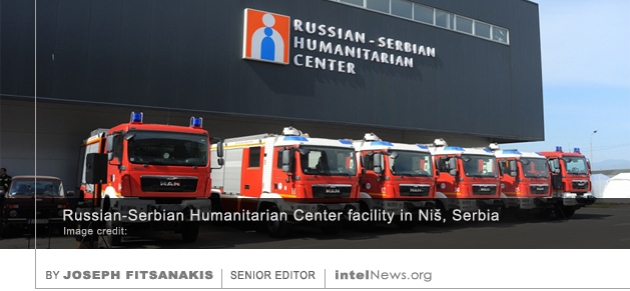Russian-trained Serb separatists are forming paramilitary group in Bosnia
January 15, 2018 1 Comment
 A group of hardline Bosnian Serbs, some of whom have been trained in military tactics by Russian instructors, are secretly creating a paramilitary group to undermine the territorial integrity of Bosnia, according to reports. Information about the alleged paramilitary group was published on the Friday edition of Žurnal, a nonpartisan investigative newsmagazine. The allegations exposed by Žurnal were later repeated by Dragan Mektić, Bosnia and Herzegovina’s Minister for Security, who is himself a Bosnian Serb. Žurnal’s revelations came just days after hardline Serb separatists, dressed in dark-colored combat gear, staged a military-style rally in Banja Luka. The city of 200,000 is the administrative center of the Republika Srpska, the semi-autonomous Serb entity in Bosnia and Herzegovina. The entity was established under the terms of the 1995 Dayton peace agreement, which ended the Bosnian War that began in 1992.
A group of hardline Bosnian Serbs, some of whom have been trained in military tactics by Russian instructors, are secretly creating a paramilitary group to undermine the territorial integrity of Bosnia, according to reports. Information about the alleged paramilitary group was published on the Friday edition of Žurnal, a nonpartisan investigative newsmagazine. The allegations exposed by Žurnal were later repeated by Dragan Mektić, Bosnia and Herzegovina’s Minister for Security, who is himself a Bosnian Serb. Žurnal’s revelations came just days after hardline Serb separatists, dressed in dark-colored combat gear, staged a military-style rally in Banja Luka. The city of 200,000 is the administrative center of the Republika Srpska, the semi-autonomous Serb entity in Bosnia and Herzegovina. The entity was established under the terms of the 1995 Dayton peace agreement, which ended the Bosnian War that began in 1992.
The rally was held despite an earlier decision by the Constitutional Court of Bosnia and Herzegovina, which ruled that military-style marches by separatist organizations were unconstitutional. According to Žurnal, the rally was organized by Srbska čast (Serbian Honor), a militia made up of hardline Serb separatists. The group strongly supports Milorad Dodik, a Serb nationalist who has served as president of Republika Srpska since 2010. The investigative news site said that several members of Srbska čast’s were trained by Russian paramilitary instructors in the Russian-Serbian Humanitarian Center, a Russian-funded disaster relief center based in southern Serbia, which Western officials claim is really an intelligence base. Žurnal also said that one of Srbska čast’s leading figures, Bojan Stojković, a former commando, was trained in military schools in Russia and has been decorated by the Russian military.
Friday’s report by the investigative news outlet quoted extensively from a leaked report by Bosnia and Herzegovnia’s intelligence agency. The report allegedly states that Srbska čast leaders, including Stojković, met secretly with Dodik and discussed the formation of a new, heavily armed paramilitary unit, which will operate as an extrajudicial force in support of Dodik’s administration in Republika Srpska. One quote from the document said that the paramilitary force would engage in “possible intervention if the opposition [i.e. those opposed to Dodik] seeks to obstruct the functioning of the authorities” in the Republika Srpska. Bosnia and Herzegovina has been seeking to join the North Atlantic Treaty Organization since 2006. The country has gone through a series of stages in negotiations with NATO and ratified a membership action plan in 2010. Bosnia’s application is heavily supported by Turkey, NATO’s only predominantly Muslim member state, but is fiercely opposed by Russia and by the Balkan country’s Serb minority.
► Author: Joseph Fitsanakis | Date: 15 January 2018 | Permalink
 Staff at a Russian disaster relief center in southern Serbia have rejected claims by American officials that the facility operates as an espionage arm of Moscow’s foreign policy in the Balkans. The Russian-Serbian Humanitarian Center was built in 2012, at a cost of nearly $40 million, following an agreement between Belgrade and Moscow. Its
Staff at a Russian disaster relief center in southern Serbia have rejected claims by American officials that the facility operates as an espionage arm of Moscow’s foreign policy in the Balkans. The Russian-Serbian Humanitarian Center was built in 2012, at a cost of nearly $40 million, following an agreement between Belgrade and Moscow. Its 





